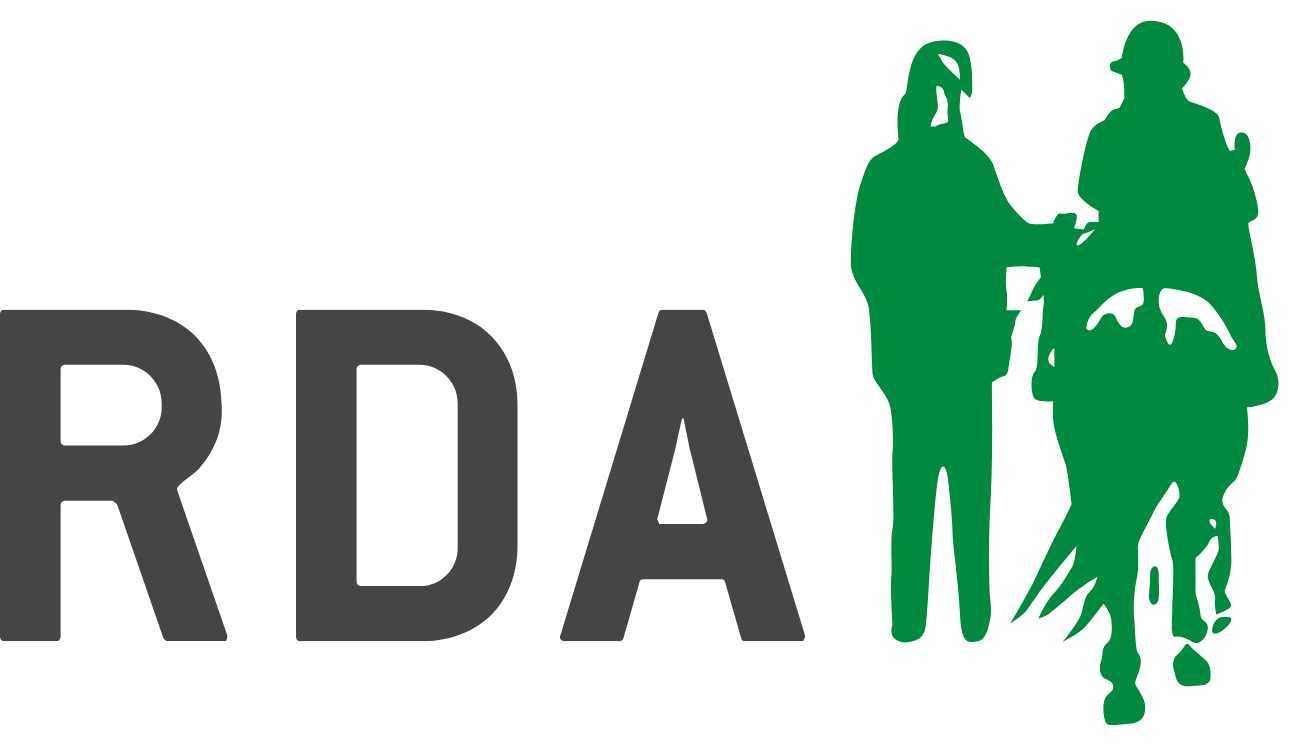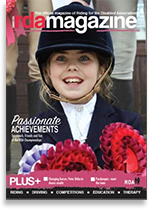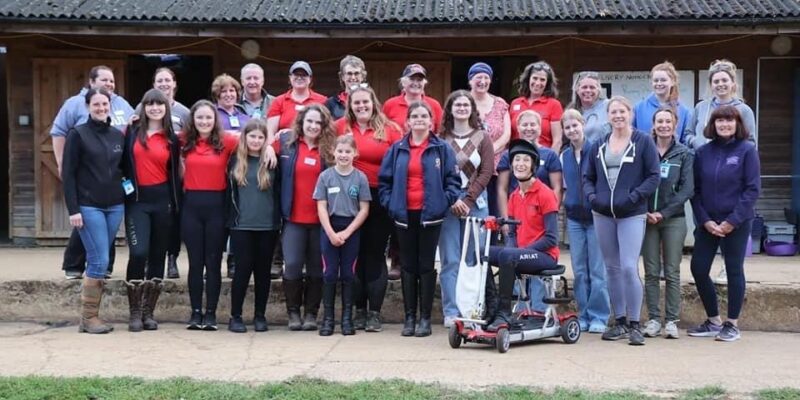
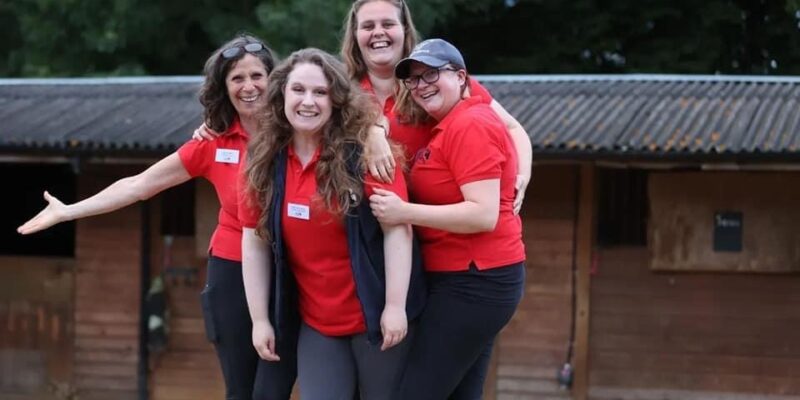
Our newest group, Aim RDA, are breaking down stereotypes and redefining what it means to be a trustee. By challenging misconceptions about qualifications, experience, and accessibility, they’re committed to proving that trusteeship is open to everyone, regardless of age, background, or career path. Aim’s volunteers are actively working to tackle common misunderstandings that often deter people from taking on a trusteeship role.
So whether you’re new to RDA, have a long history with the organisation, or bring a fresh perspective, trusteeship should be accessible to all. Aim’s trustees embody this inclusive approach, showing that anyone with the right mindset can contribute meaningfully to a board—and demonstrating how diverse perspectives and skills can strengthen an RDA group’s impact.
This Trustees Week, we sat down with Aim’s trustees to explore some of the most common myths and misconceptions that can discourage people from stepping into trustee roles. From concerns about age and qualifications to worries about time commitment and experience, the team at Aim RDA want to dispel these myths—and to show how diverse skills and perspectives are the foundation of a thriving RDA group. Meet the trustees who are challenging ideas of what it means to lead and are making trusteeship an inclusive, rewarding path for anyone with the drive to make a difference.
Myth 1: “I’m Not Qualified or Senior Enough to be a Trustee”
Meet: India Collins-Davies, Secretary
When India Collins-Davies first considered becoming a trustee, she had her doubts. Working in higher education at a UK University, India worried she might not be “qualified” or “senior” enough for a board role. Without formal equestrian qualifications or certain milestones, like horse ownership, India faced feelings of imposter syndrome and times when she felt dismissed as “not very knowledgeable.”
However, India’s long-standing commitment to RDA, where she began volunteering before even starting university, brought her a wealth of valuable experiences.

Over the years, she’s not only grown as a coach and advocate for participants but also developed a strong skill set that’s highly relevant to trusteeship. India believes her journey shows that the path to trusteeship doesn’t require reaching a specific career level or life stage; instead, it grows alongside you.
India’s work in higher education has been particularly beneficial to her role at Aim RDA. With her focus on creating opportunities and fostering inclusivity, she brings insights that directly strengthen the group’s mission. “Being part of a founding board has its own energy and sense of possibility,” she shares. “It was hard work setting up Aim RDA, but the chance to shape the future is satisfying and exciting. The ‘Why not us? Why not now?’ attitude has really helped us push forward.”
India’s background as an RDA coach also adds valuable perspective, allowing her to advocate for RDA participants on a broader level as a trustee. “My day job’s focus on creating opportunities and broadening understanding directly translates to RDA,” she says. “Believing in the value of inclusivity as a coach has evolved into ensuring that Aim RDA grows as an accessible, welcoming group for all.”
India now sees trusteeship as a great fit for her, offering a chance to grow personally and make an impact. “I’m always eager to learn, and I hope to keep bringing what I gain into my work as a trustee. I have so much to give, and if anything, I wish I’d started this level of involvement sooner.”
Myth 2: “I thought you had to be involved with RDA before becoming an RDA Trustee”
Meet: Sandra Pearce, Trustee – Safeguarding Officer
Sandra’s professional background is in local government, with a focus on safeguarding for children with Special Educational Needs. While her skills are incredibly valuable, she initially questioned whether her lack of equestrian and RDA experience would be a barrier to joining Aim RDA’s board, yet it turned out it was precisely Sandra’s safeguarding expertise that the group needed.
Without direct involvement in RDA sessions, Sandra brings a fresh, impartial perspective to board discussions, often helping the board see the “big picture” and consider diverse viewpoints. Her insights demonstrate that RDA trusteeship benefits from a wide range of experiences, not just
equestrian knowledge. Sandra finds value in offering a different perspective, one that is unconnected to daily operations but highly attuned to governance and safeguarding needs.
Reflecting on her role, Sandra says, “I’m probably a bit of a rarity within RDA. I don’t have much contact with horses, and I’m not involved in sessions the way others are, but I know the value RDA brings to participants. My professional experience in safeguarding and volunteer work as a Cub Pack leader of 42 years has prepared me to contribute in ways beyond just equestrian skills.”
While Sandra occasionally lends a hand at sessions—she’s happy to help with side-walking—she’s quick to add with a smile, “You still won’t catch me mucking out!” For her, the most rewarding part is being part of something that benefits her community, especially as she’s met fantastic people along the way.
Sandra’s advice for anyone considering trusteeship: “Don’t be put off just because you’re not horsey or haven’t been involved with RDA before. You can bring so much to the table from all different backgrounds—there’s a role for everyone, and RDA values fresh perspectives.”

Myth 3: “I’ve got a full time job, I don’t have time to be a Trustee”
Meet: Becci Hutchins, Co-Chair
For Becci Hutchins, balancing a full-time career, horse ownership, a side business, and a trustee role may seem like a juggling act, but it’s one she manages with dedication and passion. Working in grants management, Becci’s day job is often high-pressure and time-consuming. However, her commitment to RDA and Aim RDA’s mission keeps her going, even if it means tackling trustee responsibilities during off-hours. “I often end up doing RDA admin at strange times, usually on Sunday evenings,” she laughs. “But you make time for things that matter, and this feels very important.”
For Becci, the sense of camaraderie and teamwork at Aim RDA makes it all manageable. She’s part of a close-knit group of trustees, “most of us have lived and breathed RDA for years, so creating and running our own group felt like a natural progression. We all understand each other’s commitments, and if one of us is under pressure at work or with personal responsibilities, we step in to support each other.” This team approach has helped Becci balance her many roles and ensure the work is sustainable.
Being both a coach and a trustee has deepened Becci’s connection with Aim RDA’s participants and shown her how much of a difference she can make in their lives. “Seeing our riders progress, even in the short time we’ve been running, makes all the work feel worthwhile. Knowing that we’re enabling riders to achieve their dreams is incredibly rewarding.” She notes that her trustee role has also broadened her skills in ways she hadn’t expected: “I’m gaining experience in every aspect of running an organisation—skills I would never have had the chance to develop in my current job.”
Becci also emphasises the importance of open communication and self-awareness in managing the demands of trusteeship. “It’s essential to be honest about your capacity and open to taking on roles you may not have anticipated. I’m still learning to manage my time effectively and to step back to see the bigger picture. I’m hopeful these skills will only continue to grow.”
Her advice for anyone considering a trustee role with time constraints: “Don’t let concerns about time hold you back. Speak with someone you trust who’s already a trustee—whether they’re at your own group or another—and talk through any questions you might have. Think about what you want to achieve as a trustee, whether it’s developing a new skill or contributing to something you’re passionate about.”
She also encourages potential trustees to consider practical details, like time commitments and meeting logistics, so they can step into the role confidently: “Every group is different, so make sure you’re clear on the expectations at the group you’re considering. For example, if most meetings are in-person and you live far away, consider if that’s feasible. But if the mission resonates with you, and you feel ready to dive in, trusteeship can be an incredibly fulfilling experience.”


Myth 4: “I thought you had to be invited to join a board”
Meet: Vanessa Bowler, Health and Safety Officer
For Vanessa Bowler, joining a board as a trustee initially felt like something that required an invitation—a role only accessible through personal connections. With a background in health and safety within the construction and highways industries, Vanessa assumed trusteeship was a closed circle. However, after learning more, she realised that her skills were exactly what Aim RDA needed, especially as they established a new board with critical roles still open. “I wrongly thought you had to wait to be invited into a trustee role,” Vanessa explains. “But after some research, I realised I was wrong, so I decided to take the plunge and offer my help.”
Vanessa had only recently returned to the world of horses after volunteering with RDA, which reignited her childhood love for riding. This passion grew quickly and Vanessa’s enthusiasm for RDA blended with her professional skills, making her a perfect candidate for the Health and Safety Officer role.
When Vanessa learned about the Health and Safety trustee vacancy, she saw a meaningful way to contribute. “As a group of individuals, all with a shared connection to RDA, we’d talked about forming our own RDA group. A few roles had already been filled, but Health and Safety was a critical need. I wasn’t sure if everyone knew my background, but I suggested that maybe I could fill this role given my experience in safety protocols and risk management. I felt that my skills were not only transferrable but essential in ensuring the group’s safety.”
Vanessa now brings her extensive knowledge in Health and Safety to Aim RDA, adding value to board discussions and helping the group operate safely and responsibly. Her slightly “outsider” perspective also helps her see the broader picture, offering a balanced and impartial approach that benefits the entire team.
Her advice to others who may think they need to wait for an invitation to join: “Don’t hold back. If you have skills or experience that could benefit an RDA group, step forward and share them. Trusteeship is open to anyone who wants to make a difference.”
Vanessa’s story is a powerful reminder that trusteeship isn’t limited to RDA insiders or equestrian experts—it’s an opportunity open to anyone with the right skills and the drive to make an impact.
Myth 5: “I Don’t Have Any Skills I Think Are Needed”
Meet: Julie Summersbee, Aim RDA Treasurer
Julie Summersbee’s journey highlights how transferable skills can be invaluable, even when they aren’t an exact match for the role at hand. With a background in human resources but no formal training in finance or accounting, Julie initially hesitated to take on the role of Treasurer. However, she soon realised that her experience managing household accounts could serve as a foundation. Equipped with an eye for detail and a willingness to learn, Julie embraced the role, finding helpful tools like NatWest’s free accounting software to manage invoices and track group finances. Online guides and self-help resources have also provided her with the basics needed to handle the group’s finances smoothly.
Julie encourages others not to let a perceived lack of experience hold them back. She believes that being part of a board offers an invaluable learning experience and a chance to acquire new skills that can benefit both personal and professional growth. “Trustees have a shared responsibility,” she says. “It’s empowering to know that you’re never alone in the role, and it’s what you can bring to the table that truly counts.”
For those considering trusteeship but worried about skill gaps, Julie suggests researching workplace policies on volunteer support. Her employer, for instance, provides time off for volunteer work, which has enabled her to participate in training sessions and personal development. “I’d definitely recommend checking if your employer has a volunteering policy—some even offer training support, which can be a real asset,” she adds.
Ultimately, Julie’s story shows that the skills needed for trusteeship aren’t always found on paper. With passion, willingness to learn, and a team-oriented mindset, anyone can make a meaningful contribution as a trustee.
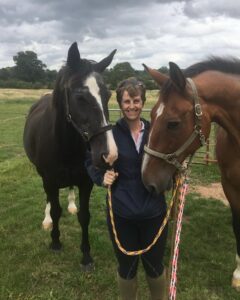
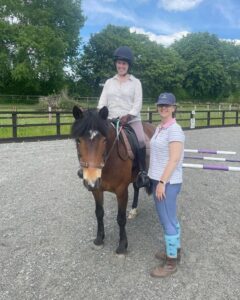
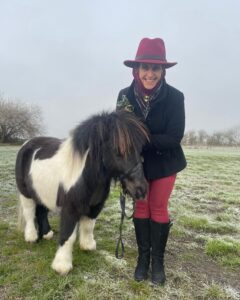
Myth 6: “I’m Too Young To Be On A Board”
Meet: Alice Summersbee, Co-Chair
Alice Summersbee initially thought trusteeship was reserved for people with decades of experience. As the youngest trustee she knew—by over 30 years—she felt unsure of her place on a board typically composed of retirees. However, with a strong background in project management, a degree in accounting, and nearly nine years of experience as an RDA coach, she quickly saw how much she could bring to the role. Now, as co-chair of Aim RDA, Alice is leading the charge to make trusteeship more accessible and visible to younger volunteers, proving that age is no barrier to impact.
Alice’s journey began after university when she returned home looking to be around horses again. RDA was a perfect fit, giving her a way to reconnect with horses while supporting a cause close to her heart. She soon trained as an RDA coach, deepening her commitment to the organisation and to its participants. When the opportunity to become a trustee arose, she initially hesitated—feeling out of place among her older counterparts—but ultimately realised that her skills in finance, project management, and coaching could make a real difference on the board.
“A diverse board of trustees makes for a successful and resilient group,” Alice says. “Age shouldn’t be a barrier—everyone has something valuable to contribute.” Through her role as co-chair, she’s actively working to make trustees more visible and approachable within her group. “When I first joined, I noticed that trustees were quite ‘invisible’—most people didn’t even know who they were, or assumed they were paid staff,” she explains. “Good communication is essential to break down misconceptions and ensure that trustees are visible and accessible to all within the group.” Alice believes that transparency and approachability not only foster trust but also help more young people feel welcome to step into these roles.
Despite occasionally hearing comments about her age, Alice is committed to showing that trusteeship is open to people of all generations. “Without younger trustees and coaches, RDA will struggle to sustain itself in the future,” she points out. “If we want these groups to survive, we need to pave the way now.” She’s proud to be part of a new wave of trustees in their 20s and 30s who are helping shape the future of RDA.
Her trusteeship has even proven valuable outside of RDA, enhancing her professional portfolio. “Employers love to see charity work—it’s a testament to transferable management and people skills,” she shares. But it’s the sense of community and purpose that drives her most. “We make a huge difference in people’s lives,” she says. “When things get hectic, I remind myself of the smiles from our riders or the thank-you card slipped to me at the end of a session. It’s those moments that make it all worth it.”
Alice’s advice for aspiring young trustees? “Don’t let age hold you back,” she urges. “The National Office and regional teams will welcome your enthusiasm and skills. Being a trustee is incredibly rewarding—and we need more young voices. Come join the fun!”
Embracing a New Era in Trusteeship at Aim RDA
Aim RDA’s trustees are rewriting the narrative on what it means to serve in a governance role. By dispelling common myths around age, experience, and background, they are making trusteeship accessible to a diverse group of individuals, each bringing their unique strengths and perspectives. This team exemplifies the impact that a broad range of experiences and fresh ideas can bring to an RDA group. They’re showing that a board strengthened by varied skills and viewpoints is not only more resilient but also better equipped to serve its community.
The trustees at Aim RDA serve as an inspiration for anyone considering a similar role, proving that there is no one “type” of trustee—just a shared commitment to make a difference. Their stories are a call to action for all who might hesitate, encouraging everyone with a passion for service to step up, challenge norms, and help secure the future of RDA. Aim RDA welcomes those who are ready to bring their own voice to the table and be part of a transformative journey, showing us that with diverse perspectives and a shared commitment, we can continue delivering life-changing work through horses.

